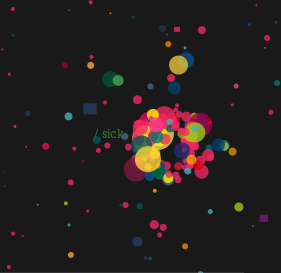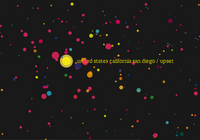
 Quite a title, huh? It's stolen from W. Somerset Maugham's interminable Of Human Bondage, which I'm reading now. The conceit of the novel is that we humans are slaves to our emotion. Despite our enlightened moments and economic man mantras, we feel strongly, dammit.
Quite a title, huh? It's stolen from W. Somerset Maugham's interminable Of Human Bondage, which I'm reading now. The conceit of the novel is that we humans are slaves to our emotion. Despite our enlightened moments and economic man mantras, we feel strongly, dammit.
A number of infosthetic (visually-digestible representations of data) sites are playing with tracking and displaying humanity's rages, murmurs, sweet whispers. We Feel Fine is into "harvesting humanity's feelings" by datamining blogs every 10 minutes for feeling-words near the phrase "I feel" or "I am feeling". (details on methodology)
***The graphics at We Feel Fine are beautiful, lively, interactive;
 very fun to try out.***
very fun to try out.***
Tiny colorful bubbles come rushing into your screen. As the radiate outward, they multiply and grow, either collecting in clumps or floating in solitude. Select a colorful point and it bounces forward into words and a sentence of emotion unfurls at the top of the screen.
You can parse the data by gender, age, weather, country/city, date or feeling.
Other emotive infosthetic display: Mood Views does three things: on Moodgrapher you select a mood and graph its rate of change, Moodteller predicts moods, and Moodsignals shows you signals associated with certain moods.
Mood Views does three things: on Moodgrapher you select a mood and graph its rate of change, Moodteller predicts moods, and Moodsignals shows you signals associated with certain moods.
 Mood Stats is a emo-journal program that allows you to track and display your notated ups and downs. (you can download free and trial for 20 days)
Mood Stats is a emo-journal program that allows you to track and display your notated ups and downs. (you can download free and trial for 20 days)
Mood News tallies the mood of news headlines on the BBC from Good (French boost aid to Cameroon) to Bad (Iraq bomb attacks leave 16 dead).
Listening Post is a live art exhibit (probably cool, but inaccessible online).
All these (so far) are via the indomitable Infosthetics.com
26.6.06
Of Human Bondage
Posted by melanie at 12:19 AM
Subscribe to:
Post Comments (Atom)




1 Comment:
One W. Nelson Roby also stole that title to add gravitas and literary pretension to one of his mopier songs! (www.theendmusic.org) And actually, Maugham stole it too, from a chapter of Spinoza's "Ethics," which purported to prove that everything that happens in the universe is necessary and good, including our submission to desires, feelings of pain, &c. I'm pretty sure that David Hume also used the same title for a chapter in one of his tomes. Both Spinoza and Hume were lifelong bachelors; it is debated whether they were asexual or just plain old gaysexual.
In short, good title!
Post a Comment